|
|
Loading... Aquinas: Moral, Political, and Legal Theory (Founders of Modern Political and Social Thought)| 69 | None | 383,173 | None | None | Founders of Modern Political and Social Thought Series Editor: Dr Mark Philp, Oriel College, University of Oxford Founders of Modern Political and Social Thought present critical examinations of the work of major political philosophers and social theorists, assessing both their initial contribution and continuing relevance to politics and society. Each volume provides a clear, accessible,historically-informed account of each thinker's work, focusing on a re-assessment of their central ideas and arguments. Founders encourage scholars and students to link their study of classic texts to current debates in political philosophy and social theory. This launch volume in the Founders of Modern Political and Social Thought series presents a critical examination of Aquinas' thought, combining an accessible, historically-informed account of his work with a re-assessment of his central ideas and arguments. John Finnis presents a richly-documentedreview of Aquinas's ideas on morality, politics, law, and method in social science, using the philosopher's own long-neglected distinctions between types of order and types of theory. Unique in his coverage of Aquinas's primary and secondary texts and his own vigorous argumentation on many themes,the author focuses on the Aquinas's philosophy while also demonstrating how this interconnects with the theological elements. In his fresh, far-reaching re-reading of Aquinas, John Finnis argues out such questions as: Is egoism rational? Why is Aristotle's paternalism wrong? Has sexual moralityany reasonable principle? What's wrong with lying and usury? Why are democracy and the rule of law aspects of the best polity? Drawing on over 60 of Aquinas's works, the author shows how, despite some medieval limitations, Aquinas makes profound, powerful contributions to present debates.… (more) |
▾LibraryThing Recommendations ▾Will you like it?
Loading...
 Sign up for LibraryThing to find out whether you'll like this book. ▾Conversations (About links) No current Talk conversations about this book. ▾Series and work relationships
|
|
| Canonical title |
|
| Original title |
|
| Alternative titles |
|
| Original publication date |
|
| People/Characters |
|
| Important places |
|
| Important events |
|
| Related movies |
|
| Epigraph |
|
| Dedication |
|
| First words |
(Preface) There are some serious flaws in Aquinas' thoughts about human society.  (Chapter 1) Thomas Aquinas was born in 1225, perhaps 1224 or early 1226, as fourth and last son of Theodora, wife of Landulf, knight and master of Roccasecca castle.  | |
|
| Quotations |
|
| Last words |
|
| Disambiguation notice |
|
| Publisher's editors |
|
| Blurbers |
|
| Original language |
|
| Canonical DDC/MDS |
|
| Canonical LCC |
|
▾References References to this work on external resources.  Wikipedia in English Wikipedia in English
None ▾Book descriptions Founders of Modern Political and Social Thought Series Editor: Dr Mark Philp, Oriel College, University of Oxford Founders of Modern Political and Social Thought present critical examinations of the work of major political philosophers and social theorists, assessing both their initial contribution and continuing relevance to politics and society. Each volume provides a clear, accessible,historically-informed account of each thinker's work, focusing on a re-assessment of their central ideas and arguments. Founders encourage scholars and students to link their study of classic texts to current debates in political philosophy and social theory. This launch volume in the Founders of Modern Political and Social Thought series presents a critical examination of Aquinas' thought, combining an accessible, historically-informed account of his work with a re-assessment of his central ideas and arguments. John Finnis presents a richly-documentedreview of Aquinas's ideas on morality, politics, law, and method in social science, using the philosopher's own long-neglected distinctions between types of order and types of theory. Unique in his coverage of Aquinas's primary and secondary texts and his own vigorous argumentation on many themes,the author focuses on the Aquinas's philosophy while also demonstrating how this interconnects with the theological elements. In his fresh, far-reaching re-reading of Aquinas, John Finnis argues out such questions as: Is egoism rational? Why is Aristotle's paternalism wrong? Has sexual moralityany reasonable principle? What's wrong with lying and usury? Why are democracy and the rule of law aspects of the best polity? Drawing on over 60 of Aquinas's works, the author shows how, despite some medieval limitations, Aquinas makes profound, powerful contributions to present debates. ▾Library descriptions No library descriptions found. ▾LibraryThing members' description |
Current DiscussionsNone Google Books Google Books — Loading...
RatingAverage: No ratings.
|



 Google Books — Loading...
Google Books — Loading...